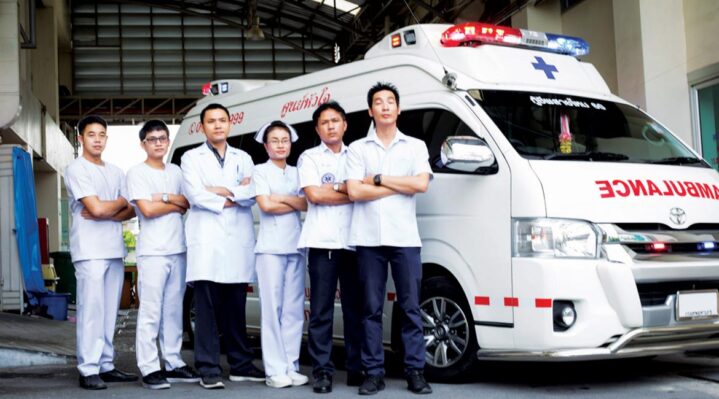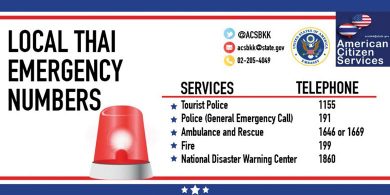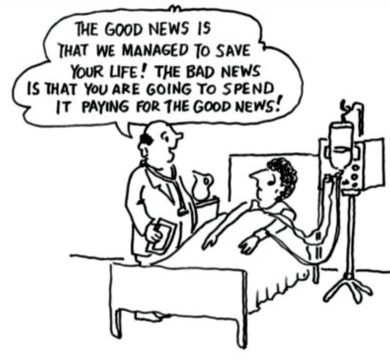
Bangkok – medical emergency – what now?
I never thought this would ever happen to me ….” might be the start of thoughts flowing in slow motion through your mind as you’re wrenched from the motorbike taxi by the impact of the lorry at the busy junction on Sukhumvit. Bad enough that you’re going to sustain as yet unknown injuries, you’re going to have to think fast when you come to a standstill; your life may depend on it!
Would you know what to do?
You might be lucky, get up with a few bruises and jump back on, but what if you need a hospital? If you’re able to, and your injuries are minimal, just flag down the nearest taxi and get to the local hospital; an easy option every time. But now you’ve landed in the gutter, the dust is slowly settling and you can see by the lacerations on your legs, the absence of feeling below your waist, and the expressions on the faces of horrified onlookers, that hospital is your only option.
Call 1646
You will most likely have your phone, if not shout for someone who has one. In Bangkok it’s unlikely that there won’t be an English speaker somewhere and if a Thai speaker calls for you, you’ll probably get a better result. Call 1646 and when someone answers they’ll already have your position on GPS (check your phone settings) and will be able to speak at least basic English, enabling an ambulance to be with you in 5-10 minutes or so. Note: The more information you can give the 1646 operator, the better the chance of getting the appropriately equipped ambulance for your injury needs. For the rest of Thailand, call 1669, but that number also covers Bangkok.

Your choice of ambulance
At this point, an ambulance has been allocated to you, but others may have heard on the airwaves, and the local ‘bush telegraph’ may have alerted nearby ambulances hovering for victims at busy junctions or even volunteer charity non-governmental services not necessarily staffed by properly trained medics! One vehicle will almost definitely arrive, but so might many others; after all, you’re a valuable cargo that the nearest hospital will pay the volunteer charity service workers handsomely for.
Take your pick when they arrive, but if your injuries are that bad, the first one would seem a sensible choice. They will assess you and decide which hospital is going to be best, given the nature of your injuries and the proximity to all available treatment. If you’re a foreigner you’ll more than likely end up at a private hospital, as state hospitals may refuse you, but you have rights and can push for them, and anyway, they have to accept you by law for at least 72 hours.
Accountants run hospitals
If you have no medical insurance and it’s looking like your treatment may take some time, you’d be better getting to a state hospital as soon as you can. You may have to fight tobe transferred to state, or have someone lobby your cause, but with the upmost respect and politeness most things can be achieved.
What might initially look like relatively minor injuries can quickly turn into something far more sinister, even ending up with you in an induced coma, on a ventilator, oblivious to your spiralling debt. You could be racking up 20,000B a day in a cheap hospital just for your room, and 50,000B if that room is in the Intensive Care Unit. I visited a friend in hospital recently who had gone through all this over a period of about 2 months, and what initially looked like the cost of a course of antibiotics, turned out to be a final bill of over 2,000,000B.
Two accountants would come to his room in intensive care every day to point out to his daughter that if she hadn’t paid her Dad’s outstanding costs by Friday, they would have no choice but to refuse all further treatment! If you have to transfer to another hospital, for whatever reason, there is usually excellent cooperation between these institutions. They will arrange for your transportation as well as your acceptance at the other end. All your notes, scans and other history will be transferred over also, so that your new doctor will be immediately up to speed on your case.
What plans can you make?
Of course, planning ahead for this kind of eventuality is never top of our list, is it? After all, it’ll never happen to you! Well it’s a good idea to at least do some planning, not just because it could save your life, but it could also prevent your financial ruin!

Carry the two medical emergency numbers with you at all times, ideally on your phone and in a place where you don’t have to search for too long. Also, carry the contact details of two people (ideally one who speaks Thai) laminated in your own and the Thai language. They should be close friends/ relatives who can be contacted immediately, or that the hospital can contact if you are unable to. You may be unconscious, so who’s going to make those possibly ‘life and death’ decisions on your behalf?
This person can be your partner, or a good friend, but make sure it’s someone who can gain access to vital information about you. They will need to know what your wishes are regarding so many things. Would you allow a blood transfusion? Are you on any medications? Have you any allergies? This along with a raft of other details, depending on how complex your medical history is. If you are going to pay for your treatment then they’ll need medical insurance information, or if you don’t have any, your bank/credit card details. A private hospital will not continue treatment without some kind of guarantee of payment!
Who can make those difficult decisions?
In short, you need to appoint a ‘Health Care Advocate’, and the choice of person is extremely important because you have to trust them, perhaps one day, with your life! Choose someone who knows you very well, cares about you, and who can make difficult decisions. A spouse or family member may not be the best choice and you have to think about that very carefully. I have a living will document, given to me by my good friend Susan Dustin, a Death-Walker (Compassionate-Care, End-of-Life Companion), and it’s called … ‘My Five Wishes: End of Life Directive.’
It’s something you can read through, then perhaps fill in now while you’re still alert and well, knowing that one day, all your dearest wishes are recorded and that a few caring people might take all that pressure from you at a time when you just need to lay back and rest.
I’ll be happy to forward this to anyone who would like one, just state whether you want it in Thai or English please. As you read through, its significance will grow on you and help you understand the importance of your undertaking. It may also, one day, make some very difficult decisions far easier for the people who love you.

Researched in collaboration with Susan Dustin of Doulagivers.com Daniel Sencier was born in London 1951, the son of Belgian/Irish parents who settled in England after the war. He spent his childhood being raised by his grandmother in
the Republic of Ireland, before moving to school in England. He is married to Beverley, who is Head of an International School in Bangkok, and they have eight children between them. After service in the military, aircraft and hotel industries, he retired to further his education at the University of Cumbria.
He successfully completed a Bachelor’s Media Degree then qualified as an English teacher. Now in Bangkok, Daniel is organiser of the ‘Bangkok English Speakers Lunch Group’, encouraging others to improve their English and explore this wonderful city. Contact Daniel for all your writing/copywriting/proofreading needs: [email protected]



